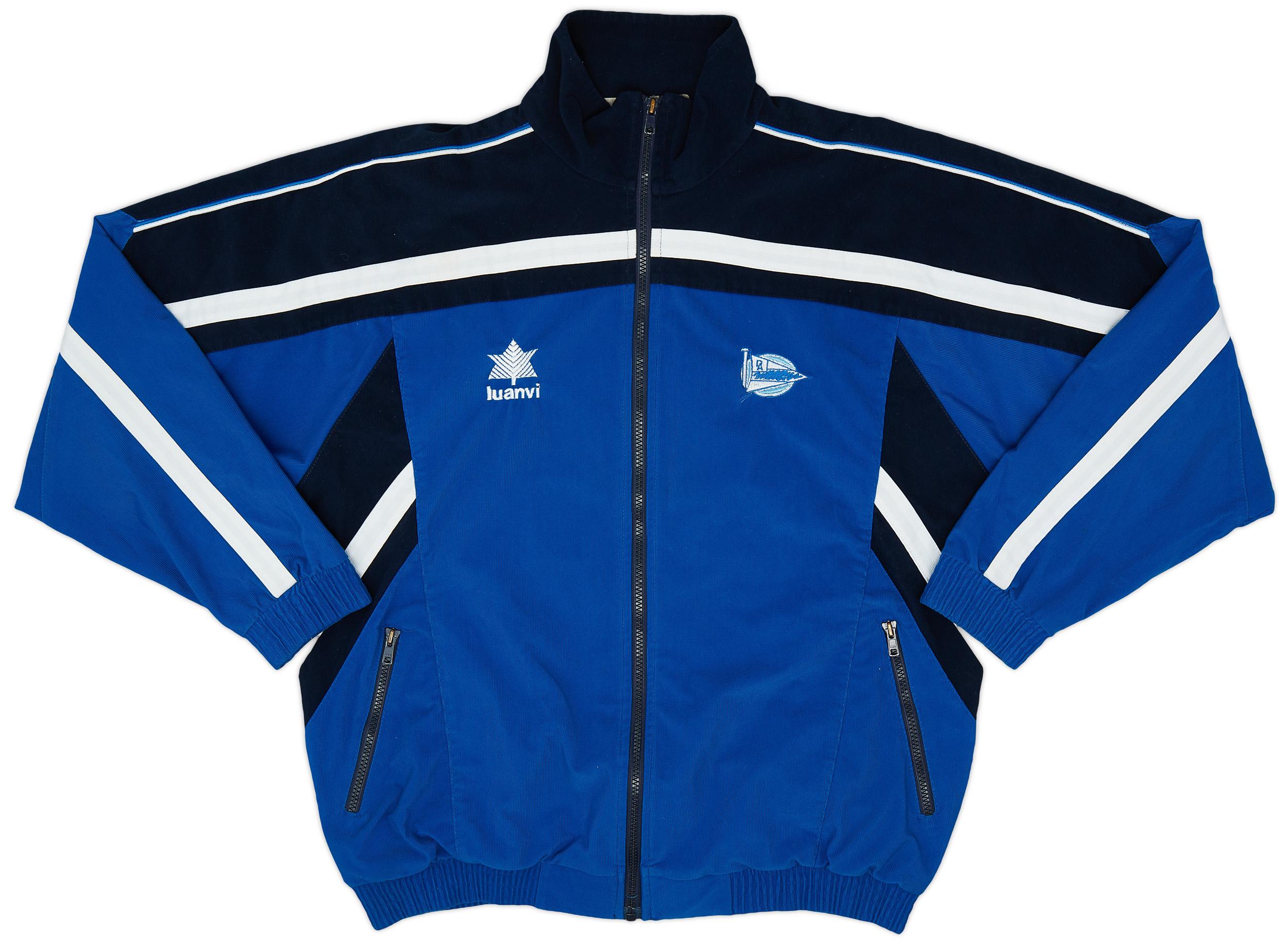Deportivo Alaves
Introduction Deportivo Alaves, often referred to as Alavés, is a prominent football club based in the city of Vitoria-Gasteiz, Spain. Founded in 1921, the club boasts a rich heritage that reflects the passionate culture of Basque football. Known for their distinctive blue and white striped kits, Alavés has captivated fans with its dedication, resilience, and […]
2000-01 Deportivo Alaves Luanvi Track Jacket - 9/10 - (L)
106.99£ - ca: €126
Introduction
Deportivo Alaves, often referred to as Alavés, is a prominent football club based in the city of Vitoria-Gasteiz, Spain. Founded in 1921, the club boasts a rich heritage that reflects the passionate culture of Basque football. Known for their distinctive blue and white striped kits, Alavés has captivated fans with its dedication, resilience, and a strong sense of community. Over the decades, Deportivo Alaves has forged a unique identity, earning a place in the hearts of its supporters and becoming an integral part of the local culture.
Club History
Deportivo Alaves was established on March 23, 1921, by a group of local football enthusiasts. The club’s name, “Alaves,” is derived from the province of Álava, where Vitoria-Gasteiz is located. The team initially played in the regional leagues and gradually ascended through the ranks of Spanish football. A defining moment in the club’s early history came in 1936 when they turned professional. The post-war period saw Alavés join La Liga for the first time in 1954, marking a significant milestone in their history.
The late 1990s and early 2000s marked another pivotal chapter for Deportivo Alaves. Under the management of legendary coach Manuel Sáez, the team achieved promotion to La Liga in 1998. The subsequent seasons witnessed an impressive transformation as Alavés became a competitive force in top-flight football, culminating in their remarkable journey to the 2001 UEFA Cup final—a feat that truly put the club on the international stage.
Achievements
Over the years, Deportivo Alaves has garnered a series of notable achievements. The pinnacle of their domestic success came in the 1999-2000 season when they finished fifth in La Liga, securing qualification for European competitions. However, it was the 2000-2001 season that forever etched their name in football history. Alavés reached the UEFA Cup final, where they faced Liverpool at the Westfalenstadion in Dortmund. Although they lost 5-4 in a dramatic match that went into extra time, this performance showcased the club’s resilience and ambition on a European platform.
In addition to their UEFA Cup run, Alavés has enjoyed success in domestic cup competitions. They reached the Copa del Rey final in 2001 but were narrowly defeated by the powerhouse FC Barcelona. The club has also claimed the Segunda División title twice, once in the 1997-98 season and again in 2015-16, which allowed them to re-establish themselves in La Liga. Their achievements reflect a narrative of growth and determination, maintaining a competitive spirit in both domestic and international arenas.
Significant Players and Matches
Throughout its history, Deportivo Alaves has been home to numerous talented players who have shaped the club’s legacy. One of the most notable figures is Iván Alonso, who played for Alavés from 1998-2001. He was a key striker during their golden period, helping the team achieve promotion to La Liga. Another standout player isAntonio “Pato” Montalvo, who made significant contributions during the club’s UEFA campaign.
In addition to these individuals, matches such as the legendary Copa del Rey clash against Barcelona in 2001 solidified Alavés’ reputation as a resilient competitor. The match captured the essence of what Deportivo Alaves represents—guts, determination, and the unpredictability of football. The club’s commitment to excellence continues to inspire players and fans alike.
Cultural Impact
Deportivo Alaves holds a cherished place in the hearts of Vitoria-Gasteiz residents. The club acts as a source of pride and unity, connecting fans from diverse backgrounds through their love for football. The Estadio Mendizorrotza, the club’s home ground, fills with passionate supporters during match days, where the sense of community comes alive. The club engages with its local audience through initiatives that promote youth development, social responsibility, and local culture.
Moreover, Deportivo Alaves emphasizes its Basque identity, actively participating in promoting local culture and values. The club’s grassroots programs and community outreach initiatives foster a strong relationship with the fans, making Central Vitoria-Gasteiz not just a hub for football, but a vibrant community where the sport resonates deeply.
Conclusion
In summary, Deportivo Alaves is more than just a football club; it is a symbol of resilience and pride for Vitoria-Gasteiz and the Basque Country. From its storied history and remarkable achievements to its significant players and profound cultural impact, Alavés stands as a testament to the power of football in bringing people together. As the club aims for future success, its legacy continues to grow, ensuring that Deportivo Alaves remains a prominent part of football history in Spain. As they look ahead, their loyal fanbase will undoubtedly support every moment, celebrating both victories and challenges with unwavering dedication.
